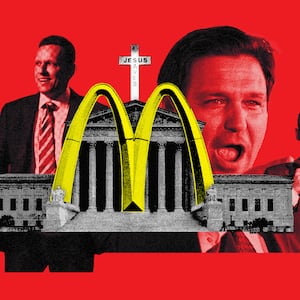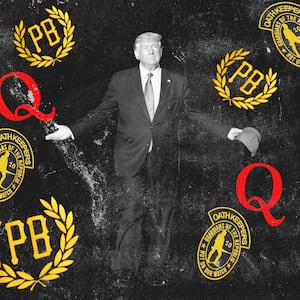The most dangerous politician in America is about to take the debate stage.
No, not former President Donald Trump—but Blake Masters, the GOP nominee for Senate in Arizona.
When he faces off against the incumbent Sen. Mark Kelly, Masters will likely be on his very best behavior. After running to the fringes of right-wing politics in his primary, he now needs to convince skeptical voters that he’s not actually as extreme as they think, and that all the crazy things they heard him say over the past year were just misrepresentations made up by Democrats and the media.
ADVERTISEMENT
But Masters is just as far outside the ideological mainstream as he let on during the primary.
He thinks that America is in a period of extreme societal decline—a “dystopian hell world,” in his words—and “evil and incompetent” Democrats are mostly to blame. To rescue our country from the left, Masters believes that America needs a more combative Republican Party willing to weaponize state power to pursue a hard-right nationalistic agenda, enforce socially conservative values, and punish anybody who gets in the way.
Of course, far-right nationalism itself isn’t all that unique within the post-Trump GOP. But Masters’ worldview is both more thoughtful and more extreme than those of his Republican counterparts. He hasn’t arrived at this perspective merely out of political expediency: he’s a true believer in hard-right nationalism and a harsh critic of small-L liberalism.

In crafting his worldview, Masters has studied, befriended, and been mentored by a set of illiberal thinkers with discrete authoritarian streaks. The illustrious list includes Singapore’s late leader Lee Kuan Yew, tech billionaire Peter Thiel, domestic terrorist Ted Kaczynski (aka the Unabomber), and “neo-reactionary monarchist” Curtis Yarvin.
If you read that and thought, “does ‘monarchist’ mean what I think it does?” The answer is yes, and Masters has been reading and recommending Yarvin’s writing for over a decade.
Far from being a trivial philosophical interest, Yarvin and his work have had a tangible influence on Masters. In one instance, when asked at a conference how he would “drain the swamp,” Masters responded that “one of my friends has this acronym he calls RAGE. Retire All Government Employees.” That friend, naturally, is Curtis Yarvin. Likewise, Yarvin’s first-ever campaign contribution was a max-out donation to Masters during the heat of the Republican primary.
To be sure, we shouldn’t treat Masters as guilty by association. But Masters’ illiberal ideology has, at the very least, been heavily influenced by his relationships with far-right extremists and authoritarians. By contrast, other right-wing Republicans like Trump or Rep. Marjorie Taylor Greene wouldn’t be able to expound on the flaws of classical liberalism in the same way that Masters does, and their relationships with extremist thinkers are superficial and transactional rather than philosophical and personal.
But ideological extremism alone doesn’t make someone the greatest threat in American politics. What makes Masters more dangerous than any of the other hard-right figures in the GOP is that his extremism is backed up by a uniquely aggressive temperament, an unrelenting hatred of the left, and an all-too-realistic path to the heights of power.
When it comes to his disposition, Masters is angrier and darker than other politicians on the American right. Take Trump for example: despite his inflammatory rhetoric, he typically attempts to deliver it with a bit of irony or humor. Masters, by comparison, is grim and sinister, and has worked hard to cultivate a “Dark MAGA” aura around himself. Just skim the homepage of his campaign website to see for yourself. Or take a look at his ominous TV ads—particularly the one in which he’s holding a gun and says, “This is a short-barreled rifle. It wasn’t designed for hunting. This is designed to kill people.” It’s this embrace of violent imagery and macho masculinity that brings Masters closer to the F-word than other Republicans.
Masters aims his aggression almost exclusively at Democrats, who he thinks are evil and bent on destroying the country.

For instance, he’s tweeted that progressivism is “the most deadly virus we face” and that “it rots brains and nations”; his website states that the “Democrats are the party of lawlessness and anarchy”; and he’s called the left “the enemy of everything that is good.” Needless to say, others within the GOP have expressed anti-leftist messages before, but Masters’ level of fury and use of dehumanizing language represent a novel escalation of the culture wars. And if he genuinely believes what he says, then he likely also thinks that he has the license to do pretty much whatever it takes to stop the left from destroying America.
What makes a potential Masters Senate victory downright scary is that he’ll have a clear path to even greater political power. Most important in this context is his backing from three key power brokers in right-wing politics.
First, there’s Donald Trump, the de-facto leader of the GOP who endorsed Masters in the primary and remains a dedicated supporter. Second, there’s Peter Thiel, the billionaire tech investor who has mentored Masters for more than a decade and dropped over $15 million to support his campaign so far. Third, there’s Tucker Carleson, the most influential voice in conservative media who calls Masters “the future of the Republican Party.” Together, the three Ts represent the political, financial, and media gears that turn the right-wing machine in America. With their support, Masters could quickly climb the rungs of GOP politics, and—if we’re being really pessimistic—it’s not hard to imagine him running for president a few years down the line.
On the other hand, if we’re lucky, Masters’ political fortunes will be torpedoed next month. One downside of staking your political prospects on a hyper-machismo image is that defeat makes you look weak. Sure, he could throw a tantrum and declare a fraudulent election, but without unwavering loyalty of the sort that Trump commands, Masters will end up looking less like a martyr and more like a sore loser.
A loss for Masters would likely deflate all the air out of his nationalistic balloon and send him to the dustbin of American politics. For the most dangerous politician in America, that’s the best outcome any of us could possibly hope for.








